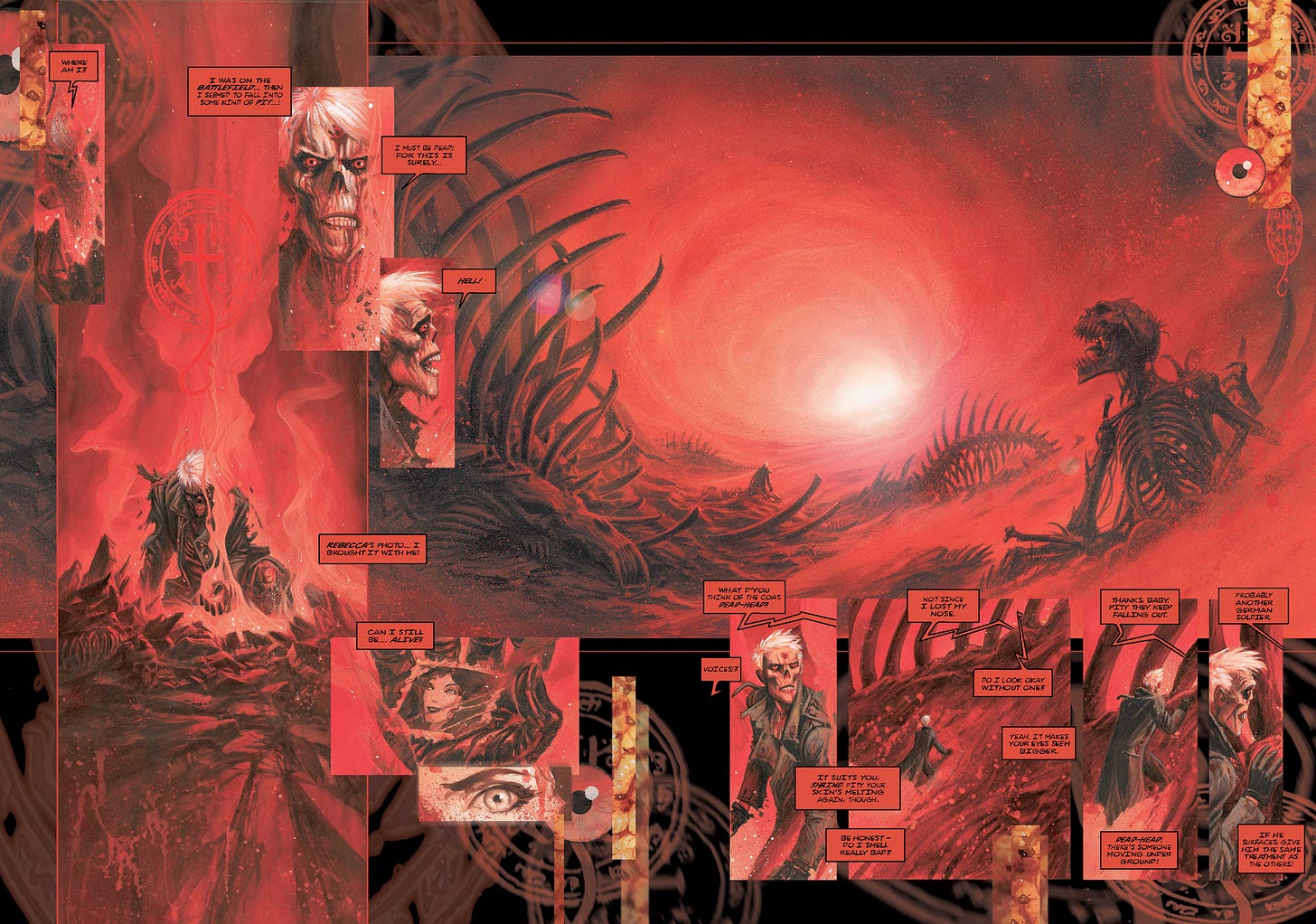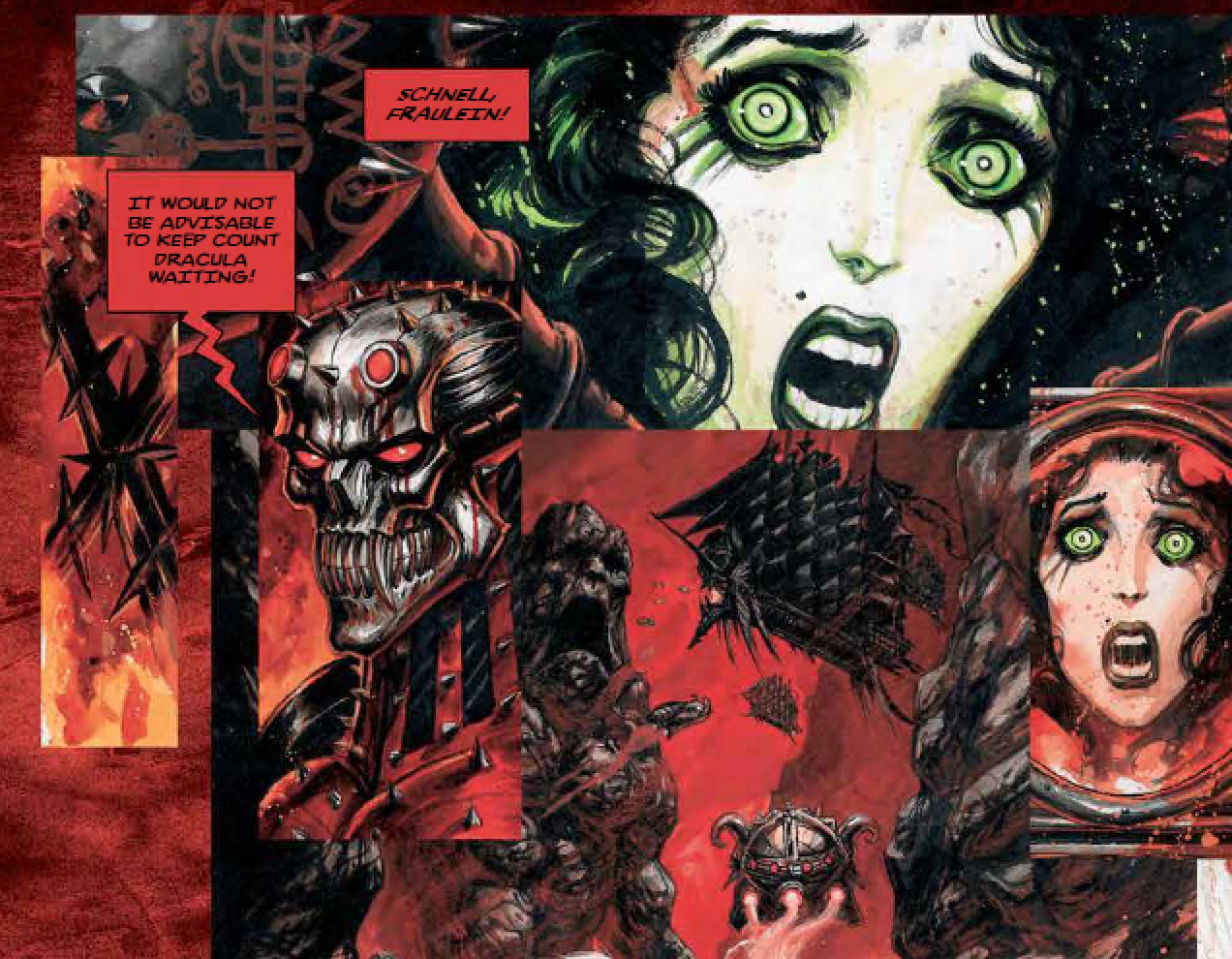Getting in the zone: Requiem Vampire Knight
After a break of 11 years, it's a creative challenge returning to my epic fantasy series
When I’m writing – or preparing to write – it can be tricky setting aside time to actually write about the process (the bit that lots of you are interested in).
So Lisa and I have hit on a solution that seems to work pretty well. She’s used to me talking to her about stories, whether it’s a plot point that isn’t quite working, a character that feels a bit thin, or as can sometimes happen, a search for the correct theme and subtext. And she’s started recording me, using a loose interview style – usually by just sitting back and letting me talk, ha! But she also adds the odd interjection, guiding question, etc. She then converts the audio to text and tidies it up (cutting out the ums and ahs) so it’s a coherent read.
I’d love to know what you think about this interview format, and if you’ve got questions on my writing process, leave a comment!
LISA: So, you’re finally back on Requiem Vampire Knight! How’s it going?
PAT: I'm currently working on the two final volumes of Requiem: volumes 12 and 13. I think it's been 11 years since I wrote Requiem volume 11 and there were all sorts of reasons why the series got held up which I won’t go into now – anyway we're finally good to go!
The first consideration in writing the final volumes of a series is that it’s just like the ending of a movie: it has to be really satisfying. So it requires perhaps more thought than the earlier volumes because it's where everything ends: if you don't have a satisfactory finale it's a bit like when you come out of a movie and you think, well it was good halfway through, started off OK, but I didn’t like the ending very much – and that's the final impression people walk away with.
So it's necessary for me to read back through all the volumes, and I wrote volume one just after the millennium, so it's like going back in time twenty-two years, which is quite strange! In a certain sense it's almost like looking at the words of another writer, because obviously nothing remains in stasis: as a writer you progress over time.
Looking back on it, there's still lots of familiar ways of putting things that I would use today, but there's also a surreal and a strange ‘other world’ quality about Requiem, especially in volume one, where the world is being introduced for the first time. It’s a world where everything is upside down and inside out and it has a chilling reality about it that I found very affecting. Because both myself and Olivier Ledroit the artist thought an awful lot about the world, how it should function and so forth. So there's that conviction to it, and there’s also a personal conviction, because I felt very driven to write Requiem. This sometimes happens with authors and usually you can find the source: whatever it is that’s motivating you to to write a particular book, but this one I think is much more fey, much more esoteric
LISA: Can you elaborate on that?
PAT: PAT: The early volumes have a certain fey quality about them because as a story it started off being something I was very driven to write from a number of directions. Firstly the idea of a world turned inside out is something I've had in mind since I was a kid. Specifically the cartography of it: what would a world look like if there was land where there was sea and vice versa. And then extending it from there, and it was like a half-formed idea that I just couldn't really get out of my system. That if you like is the background to Requiem.
On top of that there is the story element, which is central to Requiem, where Heinrich is having a secret relationship with Rebecca because he’s a German soldier and she's Jewish. The Gestapo take her away, and if he'd arrived at their apartment one minute earlier they would have taken him away as well: if he had arrived one minute later she would have been gone. So it’s that frozen moment in time where he sees her in the back of the Gestapo car and she's looking back at him. He’s thinking what can I do? And he does nothing. Well, you could ask yourself what could he do? It was that kind of emotional dilemma that I had a recurring dream about.
I'm sure it's symbolic of something else – God knows what – but anyway that moment drives the whole Requiem story and in the early volumes it was very much uppermost in my mind. It was a catharsis to let that go. Whereas by the time we get to the later volumes, specifically the one I'm working on now, the story is heading towards its finale, it's very familiar and it's very comfortable: but those early volumes were not comfortable.
LISA: So you were working something out of your system, something deeply personal?
PAT: Undoubtedly. I mean that there was that kind of moral dilemma which I'm sure was symbolic of some place else; some other time: dreams will just use any kind of material. So that was very much on my mind, but also but also generally a sense of karma and reincarnation, and wondering, how does that work?
I'd had a very different experience on Sha – a three volume series I did for Soleil, again with Olivier on art – which was pretty clear.
LISA: When you say ‘pretty clear’, you're talking about that reincarnation experience?
PAT: Yeah, but when it came to Requiem there were odd fragments of reincarnation notions and ideas of – what shall we say: ‘pursuit beyond the grave’, things like that.
LISA: It’s like you were being haunted by it?
PAT: I would say a sort of haunting. I think because the Sha experience had been so clear cut, and was almost independently verifiable, that I thought I could approach this new story in a similar way and get to the bottom of it. And I couldn't. I had these fragments and I thought well if I keep pursuing them, they'll come together into a coherent narrative and I can make sense of them. And the answer was, no I couldn't. But those fragments are actually there in the early volumes of Requiem: a sense of trepidation. For want of another phrase, pursuit beyond the grave. Pursuit beyond death. Things like that.
And in addition to that esoteric element, one of the things I observed as I was going through volume 1 was that I kept thinking, wow that's really nicely put! I hope I can do the same today! In other words, I was quite envious of that earlier version of me.
Now, the other thing about reading 11 volumes is that you can't just read one after the other. I mean in many respects a volume is the equivalent of a short movie and nobody would really binge watch 11 one-hour episodes in one sitting…
LISA: Some people might! Ha ha!
PAT: Well, yeah, true! But I've got to take a little mental break between each volume and approach it maybe the next day, or after a couple of hours break or whatever so that I’m absorbing it properly.
LISA: And you're not consuming it as a reader, well maybe you're doing it with half an eye on a reader reaction, but also as an author seeking to find any flaws, examine the best bits, and use that to come up with the next volume.
PAT: Yep. And now I'm at this awful stage where having read all the volumes one after the other – which took me several days to do, with breaks to absorb everything – and I've made all the relevant notes, and although I have part of volume 12 worked out, there are some huge gaps!
For example, what the various threats constitute, and although I had an outline idea of what they would do (which I sketched out seven years ago), at this point in time my mind is a blank as to how to fill that in.
In other words, I've gotta go deeper inside the characters and find the inspiration to write it. Which has always happened, over a lifetime of writing, so I don't expect it to not happen now but it is nevertheless still that scary feeling of, what the hell am I gonna do with these characters? How are they going to operate? How is Dracula going to defeat them? Will he defeat them? All those kinds of things. So I've got a long journey ahead of me on this.
LISA: Have you got an endpoint of say, how Requiem and Rebecca end up in the finale? Are you working towards a fixed point or is it quite open?
PAT: I do, but I’m not going to say because I don’t want to spoil it for everyone!
LISA: *whispers* tell me later…
PAT: Yeah! I can say that I kill off a few people… And there's the challenge: you work out one plot aspect, then you realise there's so much else left to do. I suppose your average full-blown novel is equally complex. I’m thinking of say, The Three Musketeers or The Moonstone. Both of them have quite a large cast of characters, lots of interplay, and so forth. At this point in time I’m thinking, who are my characters based on, and how does that function? There's still some gaps.
LISA: When you say, who are they based on, do you mean, where are you drawing inspiration from so they have substance and they mean something? They're not just characters doing things for the sake of it.
PAT: Correct. They can't do things just for the sake of it in my world anyway, because I'm incapable of writing those kinds of scenes. I always envy writers who can occasionally do this and do it very well. No, I've got to dive deep.
LISA: Quiet thinking time?
PAT: Something like that. There’s a long journey ahead because there’s still more stuff to check and collate. It’s inevitable really. You’re talking about the end: volumes 12 and 13 represent the conclusion of this massive saga, so I’ve got to tie everything up, get everything in position.
And I’ve got to feel excited about it, because if I'm not excited about it, then the readers won't be. And I won't start writing until I’m excited. Until I’m fired up!
So yeah, that’s a little bit of my process. I’ll check back in a couple of days when I’ve made more progress!
The Requiem Vampire Knight series is available on Kindle.








I like the format. Lisa having an inside track does give the impression that there is little, if any, waste in the interview. And without lack of knowledge nor overflowing reverence. This cut to the chase whilst also giving room for full answers. That, or Lisa edited it REALLY well. Thanks.
Brilliant news! Really looking forward to reading these!